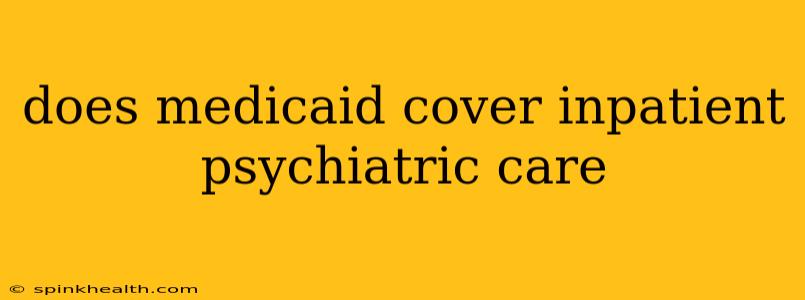Does Medicaid Cover Inpatient Psychiatric Care? Navigating the Maze of Mental Healthcare Coverage
The question of whether Medicaid covers inpatient psychiatric care isn't a simple yes or no. It's a journey through a complex system with varying rules depending on your state and specific circumstances. Imagine this: Sarah, a young woman struggling with a severe depressive episode, needs immediate inpatient psychiatric care. Her family, relieved to find a facility that can help, immediately wonders, "Will Medicaid cover this?" This is where the story gets interesting.
Medicaid, a joint federal and state program, aims to provide healthcare for low-income individuals and families. While the federal government sets minimum standards, individual states have considerable leeway in designing their specific Medicaid programs. This means that the extent of coverage for inpatient psychiatric care can vary significantly from state to state.
What Does Medicaid Typically Cover?
Generally, Medicaid aims to cover medically necessary services. This includes inpatient psychiatric care when it's deemed necessary for the individual's treatment. This might involve things like:
- Medical stabilization: Managing acute symptoms, preventing harm to self or others.
- Psychiatric evaluation and diagnosis: Determining the appropriate course of treatment.
- Medication management: Administering and monitoring prescribed medications.
- Therapy and counseling: Individual, group, or family therapy sessions.
What Factors Influence Medicaid Coverage?
Several factors influence whether Medicaid will cover inpatient psychiatric care in a specific case:
-
State variations: As mentioned earlier, each state's Medicaid program has its own rules and regulations. Some states might have more generous coverage than others, particularly for mental health services. It's crucial to check your state's Medicaid website or contact your state's Medicaid agency directly.
-
Level of care: The type of facility and the intensity of treatment are factors. Medicaid might cover care at a general hospital with a psychiatric unit, a specialized psychiatric hospital, or a residential treatment center. The level of care must be deemed medically necessary. A less intensive level of care, like outpatient therapy, might be preferred if it's deemed sufficient.
-
Prior authorization: Many Medicaid programs require prior authorization for inpatient psychiatric care. This involves obtaining approval from the Medicaid agency before starting treatment. Failing to obtain prior authorization could lead to denied claims.
-
Individual circumstances: The specific diagnosis, the severity of the illness, and the individual's overall medical history all play a role in the determination of medical necessity.
How to Find Out About Your State's Medicaid Coverage?
So, Sarah and her family need to know the specifics for their state. Here's how to navigate this:
-
Check your state's Medicaid website: Most state Medicaid agencies have websites with detailed information about coverage for mental health services. Look for sections on benefits, covered services, and prior authorization procedures.
-
Contact your state's Medicaid agency directly: If you can't find the information online, call the agency's customer service line. They can provide personalized information based on your situation.
-
Speak to the healthcare provider: The admitting hospital or psychiatric facility should be able to assist with verifying Medicaid coverage and navigating the pre-authorization process.
What if Medicaid Doesn't Cover All Costs?
Even with Medicaid, there might be some out-of-pocket costs, like co-pays or deductibles. It's important to understand what these potential costs are before starting treatment. Exploring options like financial assistance programs offered by the facility itself could help manage these costs.
In conclusion, while Medicaid generally aims to cover medically necessary inpatient psychiatric care, the specifics depend on a range of factors. Proactive research and clear communication with your state's Medicaid agency and healthcare providers are crucial steps to ensuring access to appropriate care. Remember, Sarah's story highlights the importance of knowing the intricacies of your state's Medicaid program. Being informed empowers you to advocate for the mental health care you need.

